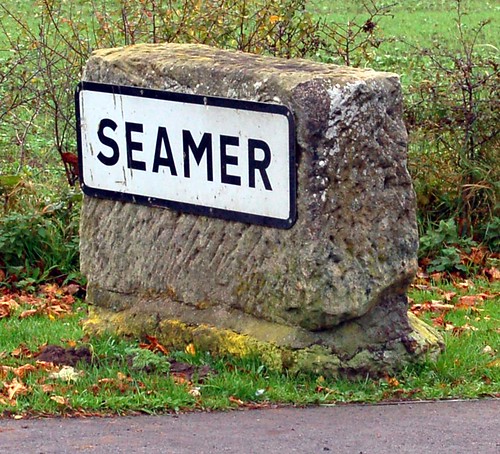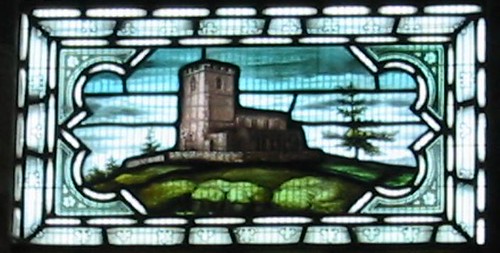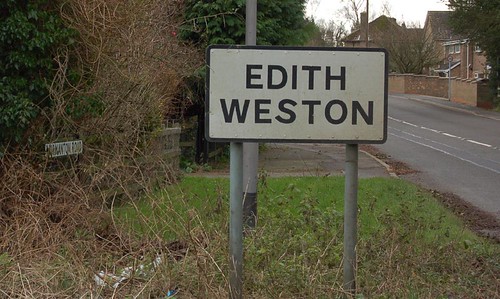 |
| Sea+mere = large lake |
For this week's Five on Friday (to join in with Amy at Love Made My Home) I'm going to take a look at a few place names to show you how to get more out of your travels. As we drive along even the swiftest motorway we see signs for all kinds of places that we've never been and are never likely to visit. But we can probably glean some information about them - just from those signs.
(Don't assume the photos match the text!)
 |
| Streetview snip |
Let's start with one of my favourites. Driving along the A64 through North Yorkshire, near Malton, you'll pass a sign for Huttons Ambo. There are lots of places in England called Hutton but, as far as I know, only one Huttons. There's a reason for that. Hutton comes from two Old English words, hoh and tun meaning a hill spur and a farmstead. Hence Hutton is a farmstead near a hill spur. Now, if you drive along the side road that's signposted Huttons Ambo you will find High Hutton and Low Hutton but you'll never find the mythical Huttons Ambo, because it doesn't exist. Ambo is Latin for 'both', so the sign is directing you to 'both Huttons', rather than a single place.
Stiffkey
Of course you can't always tell much from the name as it appears today. Modern place names have been handed down for many years, In the case of some towns that existed in Roman times that can be as long as 2,000 years. One of the earliest written records of English places was the Domesday Book; a survey of towns and villages carried out on the orders of William the Conquerer in 1086, very shortly after he won the Battle of Hastings. He wanted to know exactly how many people he now ruled and exactly what they were worth (for tax purposes). Domesday is a useful, although sometimes misleading, source about place names. On the other hand it can be surprisingly enlightening.
Over the intervening period the pronunciation of place names can have changed dramatically, and their spelling has often changed beyond recognition. Take Stiffkey, for example, on the Norfolk coast. How would you pronounce it? I'm willing to bet you'd be wrong! Domesday lists it as Stiuekai, which is much more like what the locals call it today - Stukey. On the other hand, the actual word comes from two Old English terms styfic and eg, meaning an island in a marsh, with tree stumps. (Now try the nearby town of Happisburgh and see how long it takes you to come up with the modern pronunciation of Hazebruh. No, I don't understand either!)
 |
| Skarthi's Burh |
A note for my Transatlantic readers. There are lots of towns that end with the suffix -borough in the UK. Please note, they are not pronounced 'borrow'. Borough (and similar endings like Edin-burgh) are all pronounced 'bruh' like the first syllable of brother. There's a reason for that. It's because all those endings come from an Old English word burh, meaning a stronghold or fortified town. The first half of the name then tells you something else about the place. In Scarborough's case it's the name of the guy who founded it - one Skarthi (sometimes written Skardi because of the nordic rune 'thorn' that looks like d but is pronounced th) who was the Viking lord who turned up in 966 and established a settlement there. Previously it had been the site of a Roman signal station, but Skarthi's Burh was the first town. There are other 'borough' towns, such as Boroughbridge, where the etymology is obvious, but beware. Borough Green, for example, is thought to stem from beorg, meaning hill.
Breedon on the Hill
 |
| The church, Breedon on the Hill |
Now imagine a Saxon settler wandering through the land that would later be known as Leicestershire and spotting a high hill that looks like a safe place to set up a village. The conversation possibly went a little like this.
Saxon: "Excuse me good man, what is the name of that fine cliff in the distance?"
Celt: "Bree"
Saxon: "Thank you, my woad-painted friend. I shall settle my village there and I shall call it Bree Hill."
(Or in his language, Bree Don, because that's the old Saxon word for hill.)
Many years later the village has become known as Breedon and map makers, to distinguish it from lots of other Breedons in the country, call it Breedon on the Hill - or Hill Hill on the Hill. You can't miss it. Just drive up the A42 through Leicestershire and you'll see it without any trouble at all. (Of course the village is actually at the BOTTOM of the hill because it's too steep to make living at the top workable. Only the church is at the top.)
 |
| West farmstead owned by Queen Edith. (Wife of Ed the Confessor) |
So how can I round this up? There are so many different place names, and so many reasons for those names, that limiting myself to just five is almost impossible. I could pick another favourite at random. Marsh Gibbon sounds exotic, doesn't it? But actually it just means marshy land owned by the Gibwen family. Higham Ferrers? Main (high) enclosure (ham) belonging to the Ferrers family. You'll find such manorial suffixes all over the country. Many of them are French-sounding. That's because the people who first wrote down the names in any meaningful way were French Normans, remember? Domesday and all that. Of course, the previous names were often possessive too. Goadby Marwood, for example, means farmstead of a man called Goadi, now owned by the Marwood family.
So now you know. Next time you go on a journey take note of any interesting places you spot, then see if you can find out how they got their names. But first go visit Amy at Love Made My Home and see what other fives people have found for you this week.
References
*What's in a name? That which we call a rose. By any other name would smell as sweet. Shakespeare. Romeo and Juliet.
Huttons Ambo Village Website. http://huttonsambo.blogspot.co.uk/p/about-huttons-ambo.html
Mills, A. D. 1998 Dictionary of English Place-Names. Oxford University Press.
We lived about a mile from the Huttons Ambo sign for 15 years and never knew that! We used to pass it and the song Buttons and Bows earwormed for awhile.
ReplyDeleteFascinating post as always, love Huttons Ambo!
ReplyDeleteThank you for this fun & fascinating post. And also for teaching us some English :) I did not know how to pronounce the -borough endings :) Nice to hear that a Viking called Skardi has left his mark.
ReplyDeleteWe have so odd place and village names in Finland you can't even imagine! Often while driving at the countryside it is constant laughing.
Enjoy your weekend!
I absolutely loved reading about the history of names. I think my favorite was Hutton's Ammo. You're knowledge is amazing! Pat xx
ReplyDeleteFascinating stuff, as always. Thank you! We live near a sign for Wig Wig which always makes us giggle. x
ReplyDeleteI always learn so much from your posts, thank you.
ReplyDeleteFascinating about Huttons Ambo. I've never been near it or heard of it. The other places I have. Love the name of Edith Weston and of her friend Mavis Enderby:)
ReplyDeleteOh I love a good place name and I think we do quirky ones particularly well in England! I will have to look out for Huttons Ambo next time we are up that way. Have a lovely weekend xx
ReplyDeleteThis was so interesting and informative! Of course, growing up stateside in New England, I can relate to some of these names, as towns and villages there have English names. Borough is very common and Middleborough was a town near my home. Hope I get to visit your beautiful and historical country someday. xx Karen
ReplyDeleteGreat post. When we travel in England we always wonder about the meaning of place names and their pronunciation.
ReplyDeleteNow this is a topic I love. I wrote my thesis, so many, many years ago, on place names and settlement on Cape Breton Island and how they were linked to Scottish settlement. The Great Dane likes to look at British place names and link them to Denmark, so we are always interested in road signs when we travel. Very interesting post!
ReplyDeleteIt's not just the Councils playing tricks on us then! So interesting and great fun working it all out. Many thanks.
ReplyDeleteThis post really made me smile and reminded me of places in Scotland, they were pronounced different to the way they were written, always made us chuckle
ReplyDeleteThis is such an interesting post, I really enjoyed learning more about naming places. Have a lovely weekend.
ReplyDeleteThe meaning of place names is a fascinating subject. We have them, here, too. When we were in the UK recently, I was struck by how many towns there were that we have in Canada, too. Homesick settlers, I imagine.
ReplyDeleteFabulous post. It links so well with our weekend away. We were noticing lots of place names; either laughing or wondering what they meant:)
ReplyDeleteIt is so interesting to find out how places got their names, what they mean and so on isn't it. It is also interesting how surnames came into being too isn't it, some that we can easily work out and others that are a bit if a mystery! Thank you too for joining Five On Friday. I hope that you have a great August and I look forward to seeing you again in September! xx
ReplyDeleteThank you for this very instructive post.
ReplyDeleteI was walking the Coast to Coast two weeks ago and there were so many names I did not know. One of them was "howe". I asked several locals, they didn't know either and then another foreigner (I'm French and American) gave me the definition. I'm always interested in the origin of names and don't find many people are, so again, thank you!